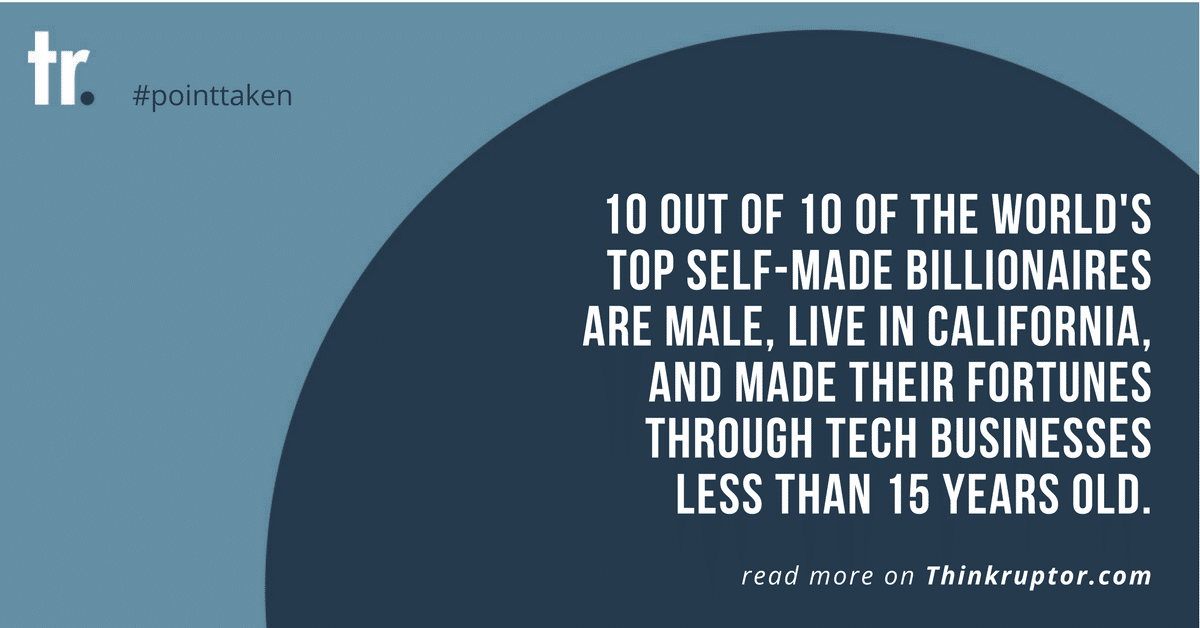What the world’s top 10 self-made billionaires have in common
As it turns out – a lot. Not that there’s a set recipe for landing on any list among the top 10 entrepreneurs of our time, but surely there must be some common traits and takeaways from their individual success stories.
There’s a new breed of self-made billionaire climbing Forbes’ renowned success lists lately and we wondered what, if any, their secret to success was.
It’s easy to notice they’re all in the fast-growing tech industry and leave it at that. But, knowing that nine out of ten tech startups fail, their paths from startup entrepreneur to billionaire obviously aren’t quite that simple.
So what’s their secret sauce? After delving just a little deeper into their background, that too is clearly visible. Their secret sauce is a killer network and the recipe was clearly crafted in US Ivy League universities.
Who’s who on the top dog list
Needless to say, Mark Zuckerberg tops the self-made entrepreneur turned billionaire list yet again, as does nearly anyone having anything to do with Facebook. In 2017, Zuckerberg, a Harvard dropout, had a mere $56bn under his belt (or under his plain, grey t-shirt), but is now clocking in at an estimated $70bn. Zuck rates #5 on the overall Forbes billionaire list.
Next up is Asana CEO and founder Dustin Moskovitz, who attended Harvard with Zuckerberg and helped launch Facebook in 2004. While Asana and Moskovitz’s other investments have him doing very well at over $10bn, he still holds a 3% stake in Facebook.
The third and fourth slots on our self-made billionaire list are shared by Snap co-founders Bobby Murphy and Evan Spiegel. The two were frat brothers at Stanford University when they started up Snapchat and their company, Snap Inc., went public on the New York Stock Exchange in March 2017. Spiegel then became the youngest public company CEO, at just 26.
Fifth on the self-made billionaire list is Airbnb co-founder Nathan Blecharczyk. After less than a decade since its inception, the company now operates in over 65,000 cities in 191 countries, with over 3 million listings worldwide. Blecharczyk was invited by former roommate Joe Gebbia to be a co-founder and chief strategist at Airbnb.
Ryan Graves, Uber’s first employee as the story goes, stands at sixth place on this list, worth between $1.2bn and $1.6bn – a tough call to make with Uber’s ups and downs these days. In 2010, Uber co-founder Travis Kalanick tweeted that he was looking for a product manager. Graves, who had previously worked at GE and interned at Foursquare, responded in a tweet saying, “Here’s a tip. Email me. :)” This leads us to believe that sometimes it isn’t about whom you know, but whom you follow.
Seventh and eighth place are again shared, this time by entrepreneurial Irish-born American brothers Patrick and John Collison, who co-founded online payment processing service Stripe. The two first made the list in November of 2016, when Stripe raised $150mn at a $9.2bn valuation, also making John Collison the world’s youngest self-made billionaire at age 25.
Instagram founder Kevin Systrom takes the number nine slot on our list, with $1.2bn and plenty of Facebook shares to keep him warm at night. Systrom launched the photo sharing app in 2010 and sold it to Facebook just two years later for $1 billion in stock and cash. Systrom has stayed on to run Instagram, having traded in his 40% stake in Instagram mostly for Facebook stock.
Last on this very particular list is Dropbox co-founder and CEO Drew Houston, clocking in his “small” fortune at just over $1bn. Houston co-founded the file sharing service with MIT classmate Arash Ferdowsi in 2007. In 2017, Dropbox announced that it was on track to reach $1 billion in annual revenues.
Stating the obvious
All of the top ten Forbes list self-made billionaires have a few things in common right off the bat. All ten are male, live in California, were born in Western, English-speaking countries, and have made their fortunes by way of successful tech startups they founded or co-founded. All except two were born and raised in the United States. The other two, the Collison brothers, who founded Stripe, are from Ireland, but were also educated in US Ivy League schools – Harvard and MIT.
All of their fortunes revolve around a total of eight tech companies, all of which didn’t exist 15 years ago – Facebook, Stripe, Snap (of Snapchat), Airbnb, Uber, Dropbox, Instagram and Asana. Instagram is now owned by Facebook and Asana was founded by Dustin Moskovitz, who previously co-founded Facebook.

A deeper look at the top 10 entrepreneurs
Taking just a slightly deeper look into their publicly available profiles, one thing becomes plain as day – nine of these top 10 self-made billionaires went to an Ivy League school. And just three schools in total – Stanford, MIT, and Harvard.
Just one, Uber’s first employee Ryan Graves, attended the Miami University of Ohio. Graves, however, was not a founder at Uber, but an employee who negotiated a good deal and bet on a startup that would later become a unicorn.
Uber founders Garrett Camp and Travis Kalanick attended the University of Calgary and UCLA, respectively, and Kalanick may not have made the last Forbes self-made billionaire list, but will be included in it next year, as he just gained official billionaire status with a $9.3bn investment deal in January 2018.
With a mix of graduate degrees from several areas and college dropouts in this list, it certainly wasn’t the level or quality of education at these schools that provided the stellar rise to success for these young men. What these schools did provide was a network of up-and-coming entrepreneurs, access to investors, and access to a pre-existing market for their startups.
Can anyone replicate this level of success?
Though some will have more difficulty than others in getting to know the right people in any industry, it’s also possible for anyone to achieve.
To be clear, this is not a secret sauce that this new breed of highly successful entrepreneurs concocted on their own. Whom you know and the circles you run in have always been important and this is what’s been running the corporate and political worlds globally for decades, if not centuries.
What this new breed of entrepreneur has changed, however, is the very definition of “the right circle”. They’ve created a circle of their own, quite possibly because there was either a lack of access to or lack of understanding from the existing corporate circle, which tended to make most of the major investments until just a decade ago.
They disrupted access to funding and access to markets themselves. So can anyone replicate this? Absolutely. Can’t get into the right crowd? Create the right crowd. And there’s your secret sauce. Package it, price it, sell it.
